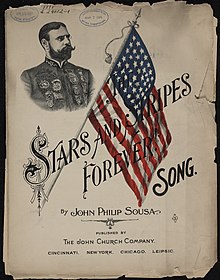The Stars and Stripes Forever
 | |
National march of the | |
| Lyrics | John Philip Sousa, May 1896 |
|---|---|
| Music | John Philip Sousa, December 1896 |
| Adopted | 1987 |
| Audio sample | |
Performed by the United States Marine Band
| |
"The Stars and Stripes Forever" is a patriotic American march written and composed by John Philip Sousa. By a 1987 act of the U.S. Congress, it is the official National March of the United States of America.[1]
History[]
In his 1928 autobiography, Marching Along, Sousa wrote that he composed the march on Christmas Day, 1896. He was on board an ocean liner on his way home from a vacation with his wife in Europe and had just learned of the recent death of David Blakely, the manager of the Sousa Band. He composed the march in his head and committed the notes to paper on arrival in the United States.[2] It was first performed at Willow Grove Park, just outside Philadelphia, on May 14, 1897, and was immediately greeted with enthusiasm.[3] Following an Act of Congress in 1987, it was officially adopted as the national march of the United States of America.[4]
Historically, in show business and particularly in theater and the circus, this piece is called "the Disaster March".[5] In the early 20th century, when it was common for theaters and circuses to have house bands, this march was a traditional code signaling a life-threatening emergency.[6] It subtly notified personnel of emergency situations and ideally allowed them to organize the audience's exit without causing the chaos and panic that an overt declaration might. Except for impending disaster, circus bands never played the tune under any circumstances.[citation needed] One memorable example of its use was during the Hartford circus fire of July 6, 1944. At least 168 people were killed, though some estimates are much higher.[7]
Music[]
This section needs additional citations for verification. (October 2019) |
"The Stars and Stripes Forever" follows the standard U.S. military march form—of repeated phrasing of different melodies performed in sections called strains: a Sousa legacy. Performances vary according to the arrangements of individual band directors or orchestrators, especially regarding tempo and the number and sequence of strains employed.
A typical performance of the march begins with the four-bar introduction, following with the first strain, which is repeated; then the second strain, which is also repeated; and sometimes both are repeated again if (the band is) marching in parade (or the breakstrain may be interjected and repeated). Now follows the dominant woodwinds in the first run of the famous Trio strain—familiar to many for the nonsense lyrics: "Be kind to your web-footed friends..."—which repeats, and later repeats again as the piccolos obligato. (Here, in some performances, Sousa's patriotic lyrics may be sung in a choral overlay.) Then follows the breakstrain, the final strain, and the breakstrain repeated. The final repeats of the Trio (the Grandioso) render the famous obligato of the piccolo players — joined to a subdued but prominent countermelody by the brass section, then bringing everything to a close with once-more repeats of the grand finale.
Sousa explained to the press that the three themes of the final trio were intended to represent the three regions of the United States. The broad melody, or main theme, portrays the North. The South is represented by the famous piccolo obligato, and the West by the bold countermelody of the trombones. The three come together in the climax, representing the Union itself.[8]
Lyrics[]
Sousa's lyrics[]
Sousa wrote lyrics to the piece, although they are not as familiar as the music itself.[9] A typical pairing of Sousa's lyrics with various sections of the march—here the First strain and the Grandioso strain—is noted in the colored bars.[10]
First strain
Let martial note in triumph float
And liberty extend its mighty hand
A flag appears 'mid thunderous cheers,
The banner of the Western land.
The emblem of the brave and true
Its folds protect no tyrant crew;
The red and white and starry blue
Is freedom's shield and hope.
Let eagle shriek from lofty peak
The never-ending watchword of our land;
Let summer breeze waft through the trees
The echo of the chorus grand.
Sing out for liberty and light,
Sing out for freedom and the right.
Sing out for Union and its might,
O patriotic sons.
Second strain
